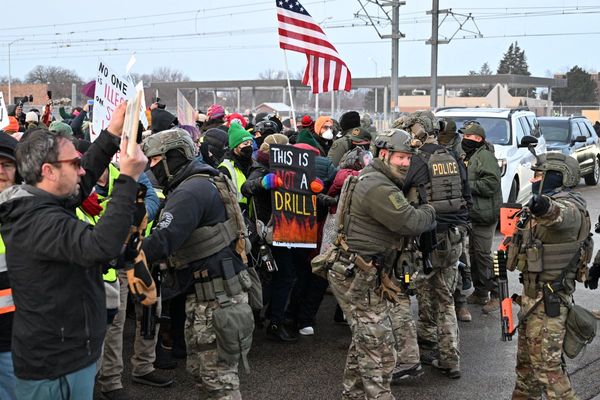SACRAMENTO, Calif. — In 1966, Gov. Pat Brown made a politically tone-deaf mistake with Cesar Chavez's farmworkers union. This year, Gov. Gavin Newsom repeated the goof. Brown redeemed himself. Newsom probably won't.
Both snubbed the union's leader and went on a family vacation.
On a personal scale, you can't blame anyone for choosing family over a labor leader.
But as most of us know — and a governor should — sometimes we need to reluctantly rank work duty ahead of family pleasure. That's the price of a career — and certainly one in top-tier politics.
Democrat Brown, a great governor who habitually bumbled politically, tarnished his image further during a year he lost a third-term reelection bid to Republican actor Ronald Reagan in a landslide.
Brown's error came at the end of a Chavez-led 300-mile epic march of farmworkers up the San Joaquin Valley from the fledging union's headquarters in Delano to the state Capitol. The workers were seeking recognition and respect. Their ranks had swelled to several thousand by the time they reached Capitol Park on Easter Sunday.
I covered the marchers' entry into the capital city up a road along the Sacramento River and remember Chavez being treated like the second coming of Jesus Christ. The mood was in tune with the mid-60s, an era of great social upheaval involving historic civil rights activism and anti-Vietnam War protests.
The fight for union representation by farmworkers was a cause embraced by many citizens regardless of their socio-economic status.
But Brown didn't seem to get it.
Chavez had asked for a symbolic public meeting with the liberal governor. Brown replied that he had a previous commitment — a fun Easter with his family at Frank Sinatra's home in Palm Springs.
A weekend with Sinatra at his resort-like estate — at the peak of the singer's stardom — would have been tough to cancel. And Brown wouldn't, although son Jerry, the future governor, argued that he should be in Sacramento with Chavez.
Brown offered to meet with Chavez on Saturday or Monday — just not on Easter Sunday — but the labor leader refused.
"He would meet on his terms or not at all. Chavez thrived on having a good enemy, and the governor's absence only made the rally stronger," journalist Miriam Pawel wrote in her book, "The Browns of California."
She also wrote a Chavez biography: "The Crusades of Cesar Chavez."
Brown later atoned by persuading a large San Joaquin Valley grower to allow a union representation election. The union had been urging consumers to boycott the grower's table grapes. The governor appointed a special mediator to create ground rules.
"The victory in the first secret-ballot election for farmworkers was an enormous boost for Chavez and the union's credibility," Pawel wrote.
"But the lasting image was of a governor relaxing in Palm Springs while the pilgrims rallied outside his office in the Capitol."
Fast-forward 56 years to another Easter period. Teresa Romero, president of the United Farm Workers union, requested a meeting with Newsom on Cesar Chavez Day, March 31. It would be a nice tribute to the iconic union leader, who died in 1993 at age 66.
But it didn't fit Newsom's schedule. He headed that day to Central and South America for a spring-break family vacation.
The governor might have made up for it if he'd been around to meet with union leaders — including legendary 92-year-old UFW co-founder Dolores Huerta — Friday. That's the day the farmworkers completed a repeat of their historic 1966 march from Delano to the Capitol. It officially was California Farmworker Appreciation Day.
Newsom declined the meeting. He had other business out of town.
The farmworkers' goal this time was to promote passage of a bill that would make it easier for them to vote in union elections.
AB 2183, by Assemblyman Mark Stone (D-Scotts Valley), would allow workers to vote by mail, just like the rest of us are permitted to do in regular elections.
The bill passed both houses overwhelmingly Monday — the Assembly by a 55-18 vote and the Senate, 26-10 — and was sent to the governor.
Newsom doesn't sound like he'll be making amends. He vetoed a similar bill last year and has indicated he'll also kill the latest version.
We haven't heard a good explanation why. The governor's office hasn't said a peep since the measure arrived.
Before that, gubernatorial aides were saying the mailed ballots wouldn't be secure.
The governor "cannot support an untested mail-in election process that lacks critical provisions to protect the integrity of the election," spokesperson Erin Mellon said.
But that was fixed in amendments. The ballots would be mailed out and collected by the state Agricultural Labor Relations Board.
Newsom's real concern is that the bill doesn't allow for immediate notifications of growers when workers are trying to unionize, Stone and UFW officials say.
The union says it won't agree to that because there's a history of some growers or labor contractors threatening undocumented union supporters with deportation.
"Our farmworkers should not be intimidated or deported because they choose to speak up about working conditions," says Sen. Maria Elena Durazo (D-Los Angeles), a former labor leader who grew up in a family of farmworkers.
She's correct. But growers should also be told when their employees are trying to organize.
Newsom needs to meet with the UFW leader and find a way to sign the bill. Don't wait for another march.
____







